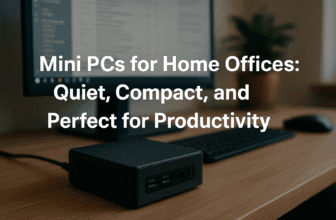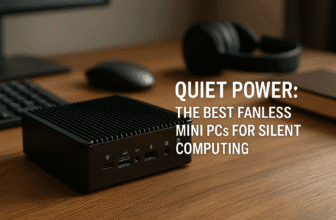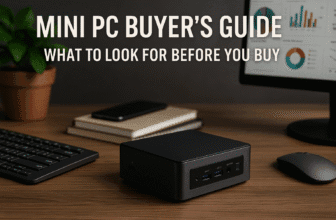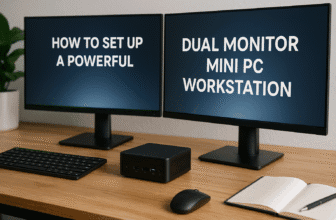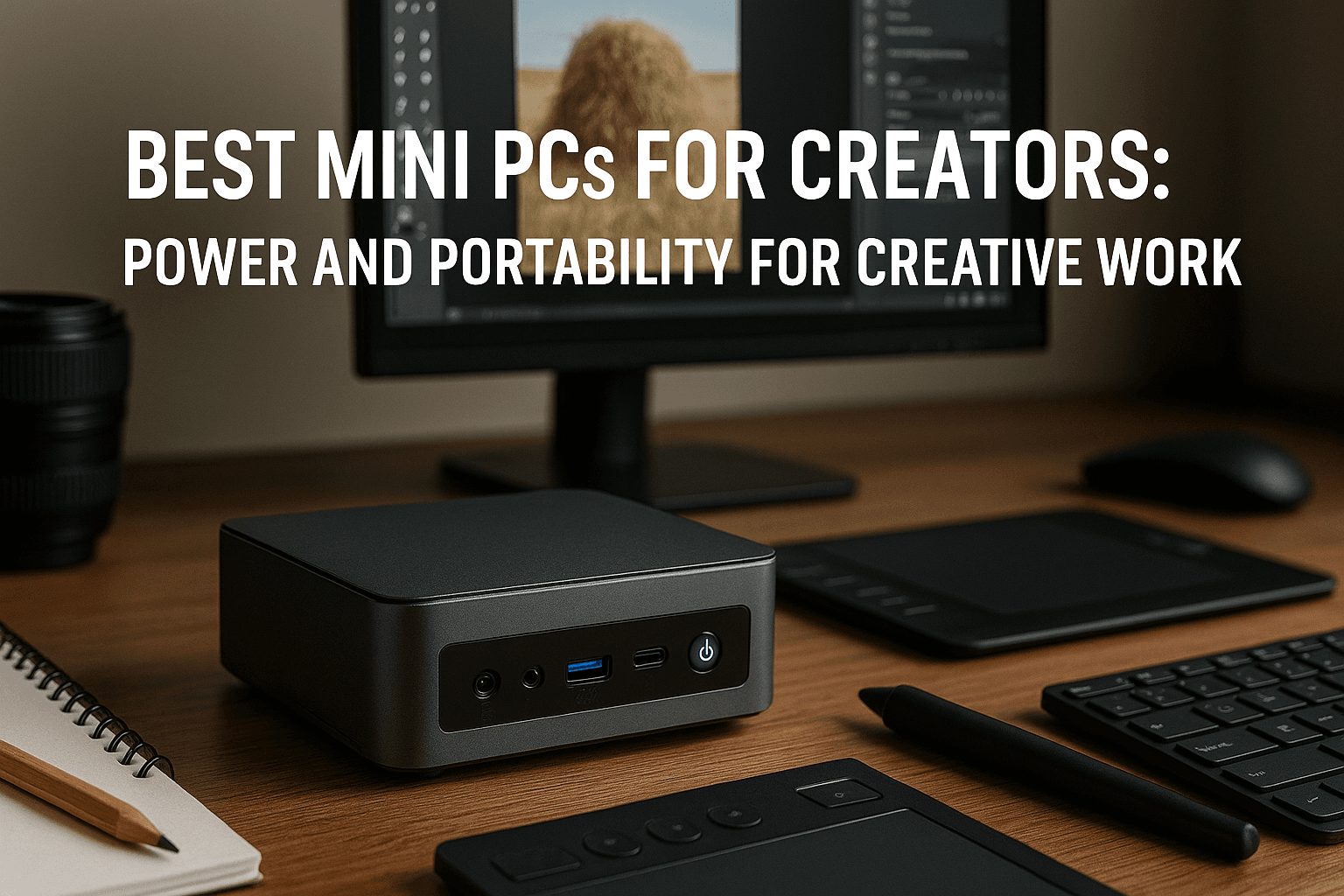
Introduction: Compact Tools for Big Creative Projects
Creative professionals—whether you’re editing videos, designing graphics, producing audio, or animating 3D models—need computing power that keeps up with demanding software and large media files. For years, the go-to option was a bulky desktop tower with loud fans and a huge footprint. But that’s changed.
Mini PCs now offer a smart, space-saving alternative for creators who need serious performance without compromising their workspace or mobility. Today’s best mini PCs deliver everything from multicore processors and powerful GPUs to high-speed storage and multi-monitor support—all in a quiet, compact form factor.
In this comprehensive guide, we’ll explore why mini PCs are a top choice for creatives, what features matter most, how to choose the right one, and which models stand out for video editing, design, audio, and more.
1. Why Creators Are Choosing Mini PCs
✅ Save Space Without Losing Power
Most creators work in multi-device environments. Drawing tablets, camera gear, microphones, lights, and dual monitors all take up space. A mini PC offers the horsepower of a full desktop but fits in the palm of your hand—or mounts invisibly behind a monitor.
✅ Quiet or Fanless Operation
Audio creators, streamers, and editors appreciate the near-silent performance of modern mini PCs. Some models use advanced cooling systems or go completely fanless, eliminating background noise entirely.
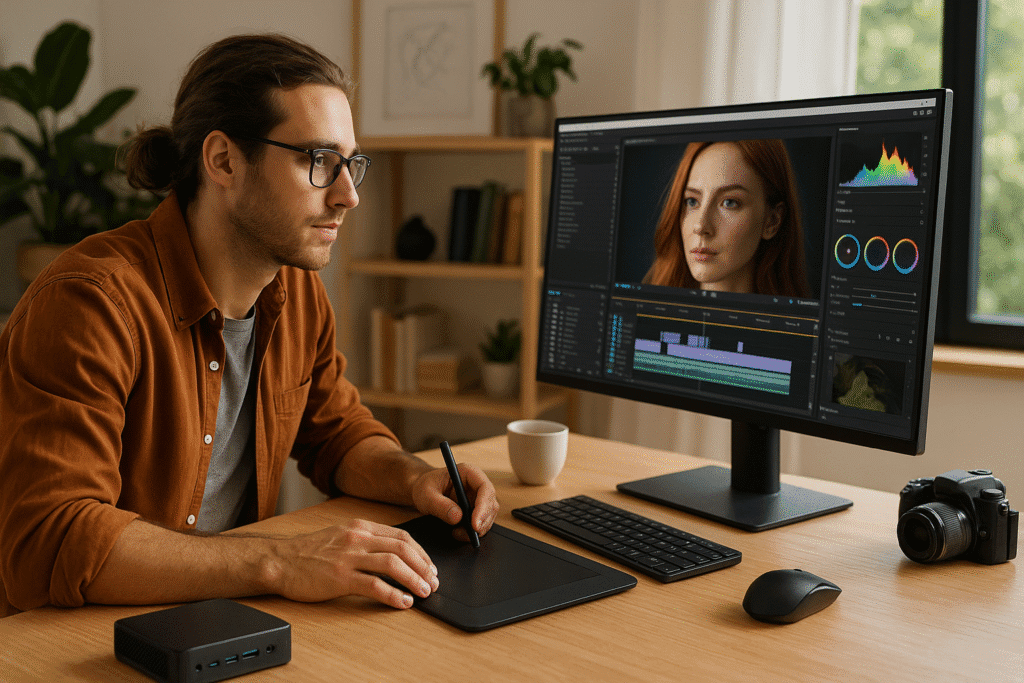
✅ Performance That Meets or Exceeds Traditional Desktops
Many mini PCs now support:
- Up to 64GB of RAM
- High-end AMD or Intel CPUs
- Integrated or discrete GPUs
- NVMe SSD storage for fast media handling
They handle 4K editing, audio production, digital painting, and large design files with ease.
✅ Flexible and Upgradeable
Though smaller than towers, many mini PCs are modular:
- Add more RAM or a second SSD
- Connect external GPUs (eGPU) via Thunderbolt
- Pair with professional displays and docking stations
2. Core Specs That Matter for Creative Work
Not all mini PCs are equal. When evaluating a system, here’s what creators should prioritize:
🔹 Processor (CPU)
Your CPU affects how quickly you can render videos, export files, and handle multitasking.
- Recommended CPUs:
- Intel Core i7 or i9 (12th gen or newer)
- AMD Ryzen 7 or 9
- Apple M2 Pro or M3 for Mac workflows
Creative Pro Tip: Look for multicore chips (8–16 cores) for smoother performance in apps like Adobe Premiere, After Effects, and Blender.
🔹 Graphics Card (GPU)
If you work in video editing, 3D animation, or game design, GPU performance matters.
- Integrated GPUs (entry-level): Intel Iris Xe, AMD Radeon 780M
- Discrete GPUs (mid-high end): NVIDIA RTX 3050 to 4070, AMD RX 7600+
Bonus: Creators can use eGPUs for extra power with mini PCs that support Thunderbolt 3 or 4.
🔹 RAM (Memory)
Creative applications like Adobe Creative Cloud, DaVinci Resolve, and 3D software eat up memory fast.
- 16GB = Minimum for light workflows
- 32GB = Ideal for video editing, music production, or design
- 64GB+ = Needed for large 3D scenes, VFX, or motion graphics
🔹 Storage (SSD/NVMe)
Speed is key when working with 4K video, RAW photos, or layered PSDs.
- NVMe SSDs (PCIe Gen 3/4) are a must
- Recommended: 1TB for active projects + 2TB external drive for archives
- Look for dual storage bays (M.2 + 2.5″ SSD) if possible
🔹 Ports and Connectivity
Ensure your mini PC has:
- USB 3.2 or USB-C ports for fast data transfer
- HDMI 2.1 and/or DisplayPort for high-resolution monitors
- Thunderbolt 4 for docking stations, displays, and eGPUs
- SD card reader (useful for photographers and video editors)
- Wi-Fi 6/6E and Bluetooth 5.2 for seamless wireless connections
3. Best Use Cases for Mini PCs in Creative Work
🎬 Video Editing
Software like Premiere Pro and DaVinci Resolve demands CPU power and GPU acceleration. You’ll need:
- i7/i9 or Ryzen 7/9
- Discrete GPU or eGPU support
- 32GB+ RAM and 1TB SSD
- Dual or 4K monitor output
🎨 Graphic Design & Illustration
Photoshop, Illustrator, and Affinity tools run great on:
- Integrated GPU (Iris Xe or Radeon 780M)
- 16GB+ RAM
- Color-calibrated displays via DisplayPort/HDMI
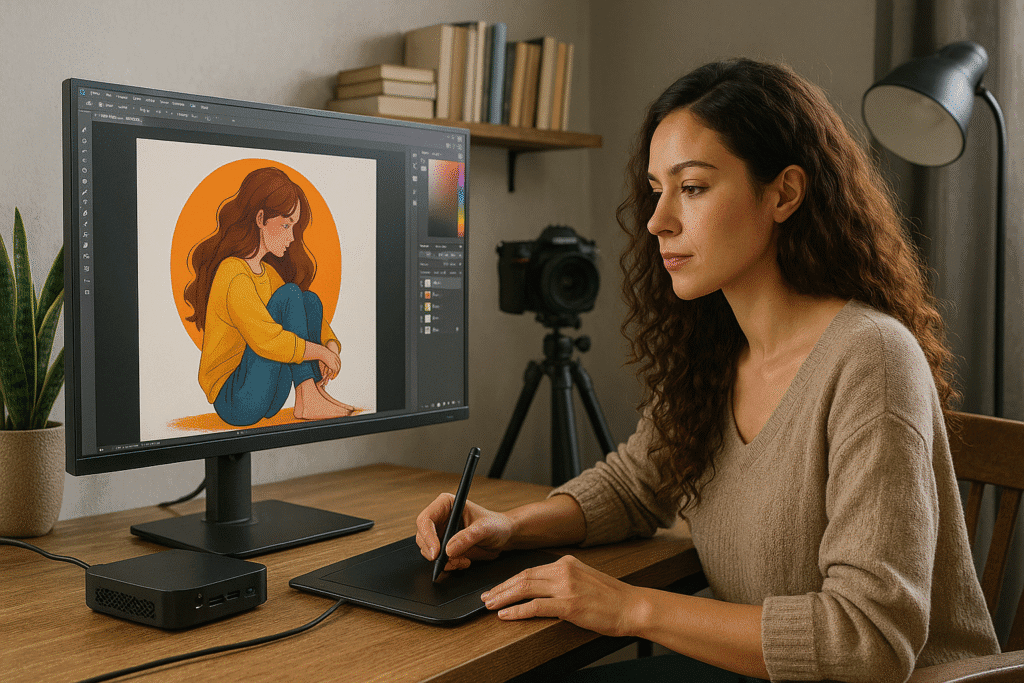
🎧 Music Production & Podcasting
Audio creators benefit from:
- Silent/fanless systems
- Multi-core CPUs for multi-track mixing
- Thunderbolt or USB ports for audio interfaces
📷 Photography
Lightroom and Capture One benefit from:
- NVMe storage (for fast imports/exports)
- 16GB+ RAM
- Dual monitor support for editing + reference display
🧱 3D Animation & Rendering
For Blender, Maya, and Unreal Engine:
- Discrete GPU is essential (RTX 3060+)
- 32–64GB RAM
- 1TB+ SSD for project files and assets
4. Best Mini PCs for Creators (Editor Picks)
🔸 Apple Mac Mini M3 Pro
- 12-core CPU, 18-core GPU
- Unified memory up to 36GB
- Perfect for Final Cut Pro, Logic Pro, and macOS creative workflows
🔸 Intel NUC 13 Extreme
- Supports full-size discrete GPUs
- Intel i9 processor, up to 64GB RAM
- Great for Windows-based Adobe workflows and 4K editing
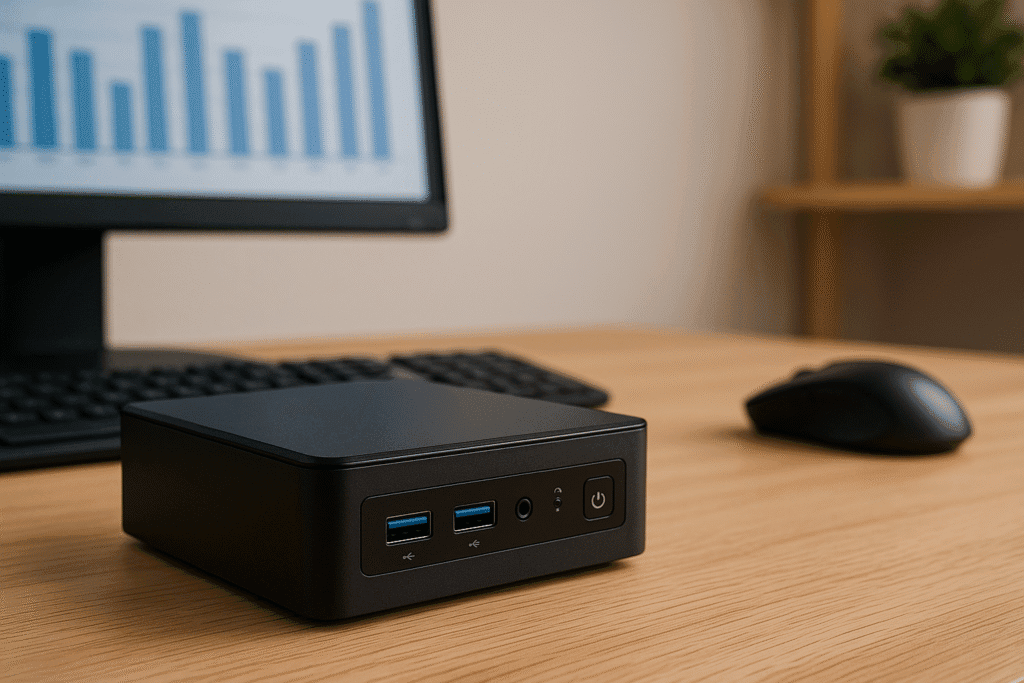
🔸 MinisForum UM790 Pro
- AMD Ryzen 9 7940HS with Radeon 780M
- Excellent for video and light 3D design
- Good thermal design with low noise levels
🔸 Beelink GTR7 Pro
- Ryzen 7 7840HS, 32GB RAM
- Dual HDMI and USB-C with DisplayPort
- Great for multitasking, graphic design, and photo editing
5. Dual Monitor Setups and Displays
Creators thrive with multiple displays. Look for a mini PC that supports:
- Two or more 4K monitors at 60Hz or higher
- USB-C or Thunderbolt if your monitors support it
- DisplayPort 1.4 or HDMI 2.1 for accurate color and fast refresh rates
6. Quiet and Fanless Mini PCs for Studio Work
Silence matters in creative spaces. Some mini PCs offer near-silent operation or no fans at all.
- Fanless Mini PCs (like Fitlet3 or MeLE Quieter3): Great for podcasting, audio editing, or media playback
- Low-noise active cooling: Look for models with quiet fans under 30dB
Bonus: A quiet mini PC helps maintain a calm, focused workspace.
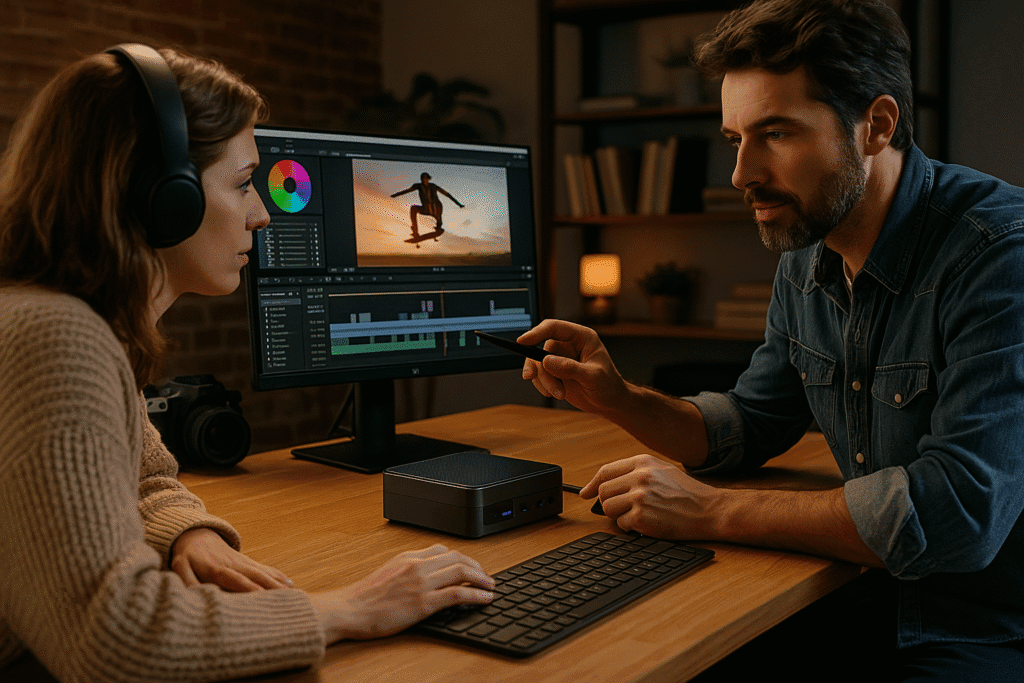
7. Creative Software Compatibility
Most professional apps are fully compatible with Windows and macOS, while Linux is gaining ground for open-source creators.
| Software | OS Compatibility | GPU Acceleration? |
|---|---|---|
| Adobe Creative Cloud | Windows/macOS | Yes |
| DaVinci Resolve | Windows/macOS/Linux | Yes (NVIDIA/AMD) |
| Final Cut Pro | macOS only | Yes (Apple Silicon) |
| Blender | All platforms | Yes |
| Pro Tools, FL Studio | Windows/macOS | Limited |
8. Tips for Creators Setting Up a Mini PC Workstation
- Use a monitor arm or riser to free desk space
- Add an external NVMe SSD for scratch disk or project storage
- Keep cables organized with Velcro or cable trays
- Calibrate monitors with tools like SpyderX or X-Rite
- Install a quiet mechanical keyboard and precise mouse for creative control
Final Thoughts: Mini PC Power for Creative Professionals
Mini PCs aren’t just for casual use or compact offices—they’re fully capable creative workstations. Whether you’re editing 4K video, illustrating, designing motion graphics, or producing music, today’s mini PCs deliver the performance and flexibility to support your artistic vision.
With the right configuration—powerful CPU, solid GPU, fast RAM and storage—you can create professional-grade content without the noise, heat, and footprint of a full-sized tower.
👉 Call to Action: Upgrade your creative workflow with a powerful mini PC. Compact, quiet, and ready for your biggest projects—without taking over your studio.signed for creators and build your next masterpiece with quiet, compact power at your side.

I am a USMC Veteran who worked with a Lot of computers and Technology while I was in. I became hooked and learned a lot in my 20 years.
At my store, I am passionate about bringing you the latest tech products that enhance your everyday life. Our mission is to provide quality, innovation, and value, making sure you find the perfect gadgets to fit your needs. Thanks for Your Support.. Larry Mac

